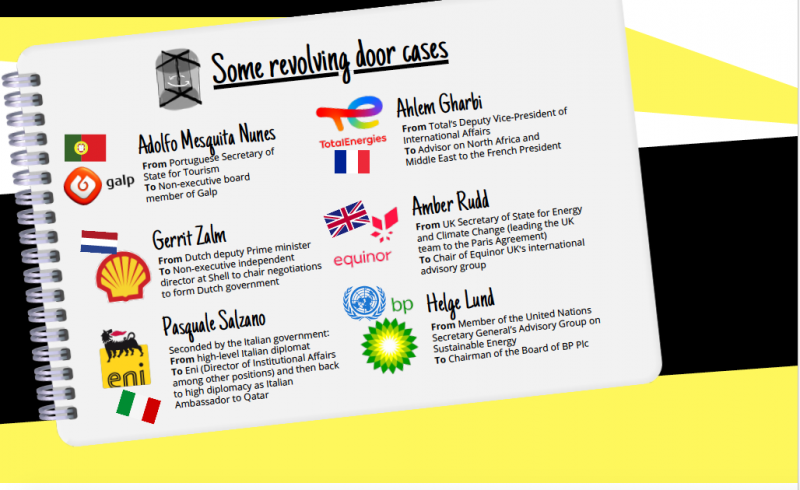
Stop the revolving door: fossil fuel policy influencers
We are already feeling the impacts of the climate emergency, with record-breaking storms, floods, droughts and fires. Over two-thirds of man-made greenhouse gas emissions come from the fossil fuel industry, and its capture of our political systems is a major obstacle to tackling this crisis.
For decades, fossil fuel companies have lobbied against effective climate action at the national, EU and international levels, blocking policies to cut emissions and leave fossil fuels in the ground. Their bag of lobbying tricks includes privileged access, huge lobby spending and revolving doors. The result is the corporate capture by the fossil fuel industry of the EU decision-making process, and the normalisation of fossil fuel interests and priorities across all political institutions.
New research by Fossil Free Politics members Corporate Europe Observatory, Friends of the Earth Europe and Food & Water Action Europe explores 71 revolving door cases involving the public sector (national governments and agencies, the EU, and international institutions) and just six Big Energy firms and five of their lobby groups between 2015 - 2021 (the full data and methodology is here). SidenoteThis content is the sole responsibility of Corporate Europe Observatory, Friends of the Earth Europe and Food & Water Action Europe and should not be regarded as reflecting the position of any of the more than 200 organisations supporting the call for fossil free politics, including the founders of Fossil Free Politics Below we highlight some of the many cases of public servants and elected representatives who have gone through the revolving door to corporate jobs with fossil fuel companies or their representatives, and officials who have moved to the public sphere from roles in these companies.
Key figures:
Between 2015 and 2021, six fossil fuel giants (Shell, BP, Total, Equinor, ENI and Galp) and five of their lobby groups (Hydrogen Europe, Eurogas, FuelsEurope, IOGP and CEFIC) were involved in the following:
-
71 revolving door cases.
-
568 meetings with top level officials from the European Commission(an average of 1.5 meetings every week over a seven-year period) SidenoteThese meetings are only the tip of the iceberg. They cover only the Commissioners, Cabinets, and Directors-Generals, the only ones who are required to declare their meetings with lobbyists. There are many more unregistered meetings with officials. We have asked for a list of these meetings but in most cases got no response; when we did receive answers there was very minimal disclosure
-
Lobbying in Europe to the tune of over €170 million
As COP26 begins in Glasgow, we have seen no real action despite the Paris Agreement commitments. To reach the Paris goal of keeping warming below 1.5°C, almost 60 per cent of oil and gas reserves and 90 per cent of coal must remain in the ground. Yet big oil and gas majors have merely pledged ‘net zero’ climate plans, a convenient cloak for business-as-usual and false solutions. Their proposals involve a variety of risky technologies and deeply flawed schemes: carbon markets, carbon capture and storage (CCS) and hydrogen for example. At the heart of these pledges are projections that would actually increase their production of gas. This smokescreen allows for continued emissions and will have significant negative social and environmental impacts when deployed at scale. It is also a distraction from the rapid implementation of a drop in fossil fuel consumption that we urgently need, and their replacement with real alternatives. Nonetheless, the majority of political institutions embrace the false solutions engineered by the fossil fuel industry.
Revolving door rules are inadequate, and regulators turn a blind eye to possible conflicts of interest whereby Big Energy benefits from the know-how and contact books of insiders. This is not simply a case of individual wrongdoing but a systemic problem across institutions.
These revolving door cases demonstrate just how normalised the model, assumptions, power and culture of the fossil fuel industry have become.
The question of the influence of oil and gas companies in political life could not be more significant. Whether they are opposing or delaying environmental action, pushing to defend dirty energy investments at the cost of human rights, securing diplomatic deals with third countries, fuelling conflict, or playing powerful roles in economics and energy ministries, we need a functioning firewall between public officials and those companies most responsible for fuelling and perpetuating climate change.
Revolving Door Cases
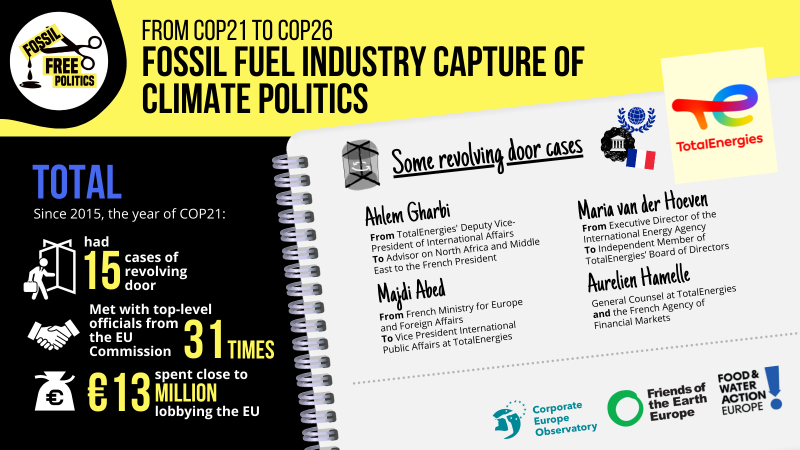
Total
Since 2015, the year of COP21, TotalEnergies has been connected with:
-
15 revolving door cases
-
31 meetings with European Commission elite
-
EU lobbying costs of close to €13 million
TOTAL Revolving Door Case 1: Ahlem Gharbi
- Public or political role:
2019-2021: Director at the French Agency for Development
2017-2019: Cabinet of the French President, Advisor on North Africa and the Middle East
- Fossil fuel industry role:
2015-2017: Deputy Vice President of International Affairs at Total
Ahlem Gharbi was Total’s Deputy Vice President of International Affairs from 2015-2017, during which time she regularly participated in events on French foreign policy in the Arab world. In May 2017, she became Advisor to the French President on North Africa and the Middle East. Between April 2019 and September 2021 she was Director at the French Agency for Development, and she was recently appointed General Director of the French Institute in Algeria.
TOTAL Revolving Door Case 2: Majdi Abed
- Public or political role:
2000-2019: several positions within the French Ministry for Europe and Foreign Affairs, including General Consul in Dubai
- Fossil fuel industry role:
2019-present: Vice President of International Public Affairs at Total
Majdi Abed spent more than 19 years at the French Ministry for Europe and Foreign Affairs (2000-2019), holding important positions such as General Consul, Deputy Director and Political Advisor. This gave him access to key diplomatic information. He left public office in August 2019, and just one month later was hired by Total as the company’s Vice President for International Public Affairs.
TOTAL Revolving Door Case 3: Maria van der Hoeven
- Public or political role:
2016-2019: Member of the EU Commission Expert Group High-Level Panel of the European Decarbonisation Pathways Initiative 2011-2015: Executive Director of the International Energy Agency2002-2010: Dutch Minister of Education, Culture and Science & Economic Affairs
- Fossil fuel industry role:
2016-present: Independent Member of Total’s Board of Directors
Maria van der Hoeven served as a minister in several departments in the Netherlands (2002-2010) before being appointed Executive Director of the International Energy Agency (2011-2015). In 2016, she was appointed as Independent Member of Total’s Board of Directors. During this same period (2016-2019), she joined a European Commission Expert Group on decarbonisation.
At a recent webinar co-organised by oil and gas company Petronas, van der Hoeven claimed: “There is no doubt the world is heading towards net zero 2050, and fossils will be part of that.”
TOTAL Revolving Door Case 4: Aurelien Hamelle
- Public or political role:
2020-present: Member of the Sanctions Commission at the French Agency of Financial Markets
- Fossil fuel industry role:
2016-present: Total Group General Counsel
While being Group General Counsel at Total, Aurelien Hamelle has also been part of the Sanctions Commission of the French Agency of Financial Markets (AMF) since September 2021.The Sanctions Commission is in charge of imposing sanctions on any person or company whose practices contravene laws and regulations that fall within the jurisdiction of the AMF.
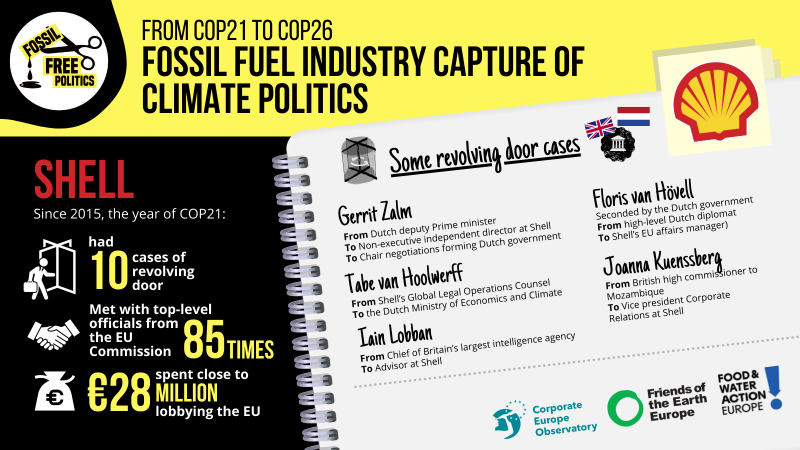
Shell
Since 2015, the year of COP21, Shell has been connected with:
-
10 revolving door cases
-
85 meetings with the European Commission elite
-
EU lobbying costs of close to €28 million
SHELL Revolving Door Case 1: Gerrit Zalm
- Public or political role:
2017: Chair of the negotiations to form a new Dutch government
1994-2007: Dutch Minister of Finance and Deputy Prime Minister
- Fossil fuel industry role:
2013-present: Non-Executive Independent Director at Shell
Gerrit Zalm served as a Dutch Minister for 13 years, from 1994 until 2007. He was nominated to be a Non-Executive Independent Director at Shell in 2013. In 2017, Zalm chaired negotiations to form a new Dutch Government whilst still being paid by Shell (€117,000 that year). Under Zalm’s supervision, according to an investigation, a policy Shell had demanded for years (the elimination of the dividend tax) was included in the Dutch Government’s coalition agreement in 2017.
Together, the EU and European governments hand out an estimated €112 billion plus each year to prop up fossil fuels.
SHELL Revolving Door Case 2: Floris van Hövell
- Public or political role:
2003-2012: Diplomat for the Embassy of the Kingdom of the Netherlands in Argentina and the USA
- Fossil fuel industry role:
2012-2014: seconded by the Dutch Government to Shell as Government Relations Advisor
2014-2017: Senior Project Advisor of Government Relations at Shell
2017-present: Senior EU Affairs Manager at Shell
Following a long diplomatic career, Floris van Hövell was seconded by the Ministry of Foreign Affairs to Shell as its Government Relations Advisor in 2012. Following this secondment, he was hired as a Senior Project Advisor on Government Relations and is now the Senior EU Affairs Manager at Shell. In this role he is leading advocacy for Shell's hydrogen business, for its broader international energy portfolio, and for the company’s membership in Hydrogen Europe, Eurogas, IOGP and others.
SHELL Revolving Door Case 3: Tabe van Hoolwerff
- Public or political role:
January 2021-present: Senior Policy Advisor Sustainable Industry at the Dutch Ministry of Economics and Climate
2011-2013: Senior Legal Advisor in different Dutch ministries
- Fossil fuel industry role:
2014-2020: Various positions at Shell, the latest being Global Legal Operations Counsel
Tabe van Hoolwerff has moved from public office to Shell and then back to public office again. He held two senior legal advisor positions in different ministries before Shell hired him for various legal advisory positions starting in 2014. After seven years at Shell, van Hoolwerff returned to public office as a Senior Policy Advisor on Sustainable Industry at the Dutch Ministry of Economics and Climate.
SHELL Revolving Door Case 4: Iain Lobban
- Public or political role:
2008-2014: Chief of the UK’s largest intelligence agency, GCHQ (Government Communications Headquarters)
- Fossil fuel industry role:
2015: Advisor to Shell
After retiring from the leading UK surveillance agency in 2014, Iain Lobban was hired by Shell as an advisor on cybersecurity issues.
SHELL Revolving Door Case 5: Joanna Kuenssberg
- Public or political role:
2014-2018: British High Commissioner to Mozambique
- Fossil fuel industry role:
2018-2021: Shell’s Vice President of Government Relations with Russia and CIS
2021-present: Shell’s Vice President of Corporate Relations with MENA and CIS
After holding an important diplomatic position as British High Commissioner to Mozambique for four years (leading the UK’s support for the private sector among other tasks), Joanna Kuenssberg was hired by Shell in 2018 as its Vice President of Government Relations with Russia and the CIS, and since 2021 with the MENA and CIS regions.
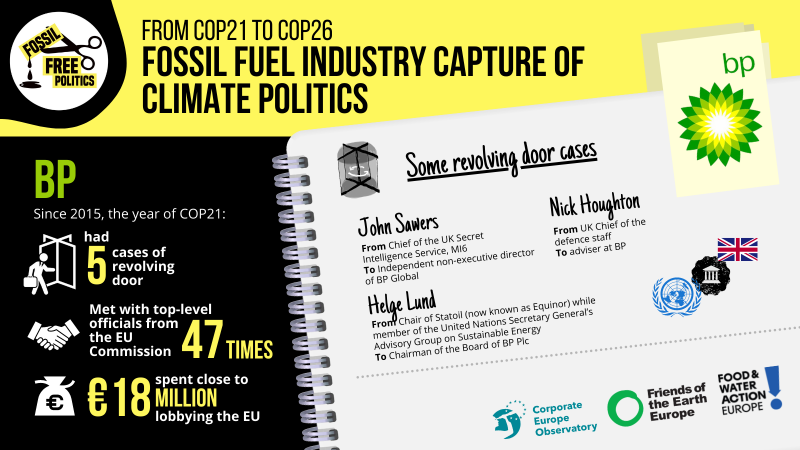
BP
Since 2015, the year of COP21, BP has been connected with:
-
5 revolving door cases
-
47 meetings with the European Commission elite
-
EU lobbying costs of close to €18 million
BP Revolving Door Case 1: John Sawers
- Public or political role:
2009-2014: Chief of the UK Secret Intelligence Service, MI6
- Fossil fuel industry role:
2015-present: Independent Non-Executive Director of BP Global
John Sawers is the former Chief of British Secret Intelligence Service or MI6 (2009-2014) and was UK’s Ambassador to the United Nations for two years after serving as Political Director of the British Foreign Office. BP recruited the former diplomat and military expert as its Independent Non-Executive Director in 2015. Sawers has earned £699,000 (€821,031) with BP since 2015.
BP Revolving Door Case 2: Nick Houghton
- Public or political role:
2013-2016: Chief of the Defence Staff of the British Armed Forces
- Fossil fuel industry role:
2017-present: Advisor to BP
In 2016, Nick Houghton left his role as Chief of the Defence Staff, Britain’s most senior military position. Since 2017 he has provided independent strategic advice to BP at the board level on the company’s operations in Turkey, the Middle East and North Africa, including advice on the related geopolitical risks such as crisis preparedness and response management. In 2020, Houghton also became an advisor to the artificial intelligence firm White Space, which focuses on the oil and gas industry and works closely with Shell.
BP Revolving Door Case 3: Helge Lund
- Public or political role:
2011-2014: Member of the United Nations Secretary General’s Advisory Group on Sustainable Energy
- Fossil fuel industry role:
2019-present: Chairman of the Board of BP (joined BP board in 2018)
2004-2014: CEO of Statoil (now Equinor)
Helge Lund was a Member of the United Nations Secretary General’s Advisory Group on Sustainable Energy for three years, until 2014, during which period he was also the CEO of Statoil, the Norwegian oil and gas company now known as Equinor. BP named him Chairman of the Board in 2019.
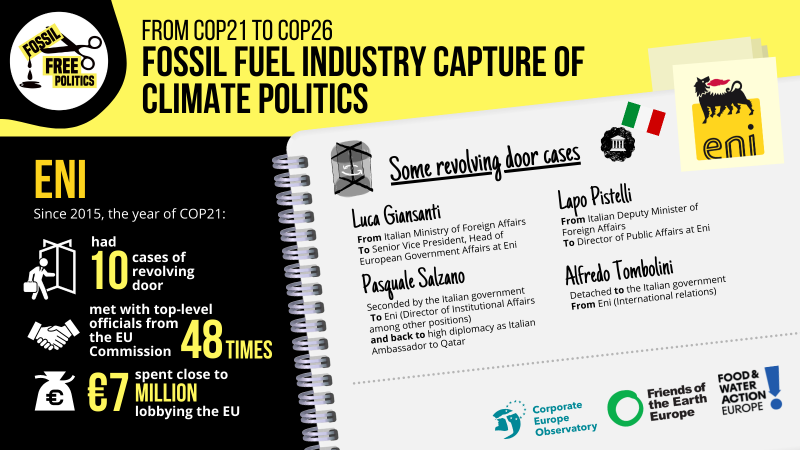
Eni
Since 2015, the year of COP21, Eni has been connected with:
-
10 revolving door cases
-
48 meetings with the elite of the European Commission
-
EU lobbying costs of close to €7 million
ENI Revolving Door Case 1: Luca Giansanti
- Public or political role:
2014-2018: Political Director (Director General for Political Affairs and Security), Ministry of Foreign Affairs and International Cooperation of Italy
2013-2014: Ambassador, Embassy of Italy in Tehran
- Fossil fuel industry role:
2019-present: Senior Vice President, Head of European Government Affairs at Eni
After holding important diplomatic roles – as an Ambassador to Iran and Political Director at Italy’s Ministry of Foreign Affairs and International Cooperation, Luca Giansanti was appointed as Eni’s Senior Vice President, Head of European Government Affairs in 2019. He has participated in several events organised by EU media and trade groups affiliated to the fossil fuel industry together with EU climate and energy decision makers.
ENI Revolving Door Case 2: Pasquale Salzano
- Public or political role:
2017-2019: Italian Ambassador to Qatar
1999-2013: Diplomatic official, including Head of the G8-G20 Sherpa Office at the Italian Prime Minister’s Office
- Fossil fuel industry role:
2011-2014: seconded by the Ministry of Foreign Affairs to Eni as Head of International Institutional Relations and Head of the Eni office in the United States
2014-2017: Senior Vice President, then Executive Vice President and Director of Institutional Affairs at Eni
Pasquale Salzano was seconded in 2011 by the Ministry of Foreign Affairs to Eni and became Head of International Institutional Relations and Head of the Eni office in the US. He was first appointed as Eni’s Senior Vice President, and later as Executive Vice President and Director of Institutional Affairs. He became the Italian Ambassador to Qatar in 2017. Notably, the Italian state actually seconds officials to Eni and vice versa.
ENI Revolving Door Case 3: Lapo Pistelli
- Public or political role:
2013-2015: Deputy Minister of Foreign Affairs
2004-2015: Member of the European Parliament and then the Italian Parliament
- Fossil fuel industry role:
2015-present: Various positions at Eni; since July 2020 Director of Public Affairs
After being elected as a European MEP and then an Italian MEP, Lapo Pistelli was appointed Deputy Minister of Foreign Affairs in the Italian Government in 2013. In 2015, the same year he left his high-level public office, he moved directly to Eni where he is now the Director of Public Affairs.
ENI Revolving Door Case 4: Alfredo Tombolini
- Public or political role
2017-2019: seconded from Eni to the Italian Ministry of Foreign Affairs at the Directorate-General for Globalisation and Global Issues (DGMO)
- Fossil fuel industry role
2016-2019: International Relations at Eni
While working at Eni on international relations, Alfredo Tombolini was seconded to the Italian Ministry of Foreign Affairs at the Directorate-General for Globalisation and Global Issues to promote Italian investments abroad in the energy sector, i.e., directing the country's public financing.
ENI Revolving Door Case 5: Natalie Tocci
- Public or political role
2015-2019: appointed Special Advisor to Federica Mogherini, EU High Representative for Foreign Affairs and Security Policy
2020: Appointed Special Advisor to Josep Borrell, EU High Representative for Foreign Affairs and Security Policy
- Fossil fuel industry role
2020: Appointed by the Italian government to three committees in the Eni Board of Directors.
Nathalie Tocci was Special Advisor to the EU High Representative for Foreign Affairs and Security Policy/Vice President of the European Commission from 2015 to 2019. In 2020 she became a member of Eni's Board of Directors, as well as Special Advisor to Josep Borrell, the EU High Representative for Foreign Affairs and Security Policy/Vice President of the European Commission.
FoEE, CEO and ReCommon filed a complaint with the European Commission for this conflict of interest. Perhaps as a consequence, the European External Action Service has not yet given Tocci any mission in her role as Special Advisor.
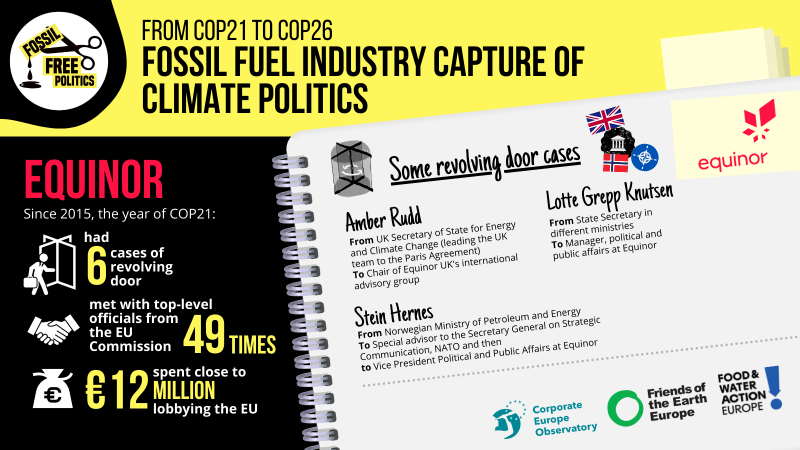
Equinor
Since 2015, the year of COP21, Equinor has been connected with:
-
6 revolving door cases
-
49 meetings with the elite of the European Commission
-
EU lobbying costs of close to €12 million
EQUINOR Revolving Door Case 1: Amber Rudd
- Public or political role:
2018-2019: Secretary of State for Work and Pensions. She also served as Minister for Women and Equalities.
2016-2018: UK Home Secretary
2015-2016: Secretary of State for Energy and Climate Change, leading the UK team in the Paris Climate Change Agreement
- Fossil fuel industry role:
2020-present: Chair of Equinor UK's International Advisory Group
After serving as Secretary of State for Energy and Climate Change, Equalities Minister, Secretary of State for Work and Pensions and Home Secretary while a Member of Parliament for Hastings and Rye, Amber Rudd was nominated Chair of Equinor UK’s International Advisory Group in 2020. This group aims to provide the company with “diverse views and experiences” from its members.
Equinor claims that members of the Advisory Group don’t represent the company. However, Rudd recently represented Equinor at an event sponsored by the company and organised by EU media network Euractiv. She noted during the event: “What I would like from the politicians who are coming ... is policy decisions that would allow businesses to develop the solutions.”
Rudd supports the development of carbon capture and storage (CCS) technology (the UK Government has been a key proponent). Equinor is planning a controversial fossil hydrogen plant in the UK, which will use fossil gas in combination with CCS. Although CCS is a costly technology that has failed to deliver, the oil and gas industry (and the EU’s Hydrogen Strategy) claim that it is ‘low carbon’ and are banking on it to capture the emissions created by producing hydrogen from fossil fuels.
EQUINOR Revolving Door Case 2: Lotte Grepp Knutsen
- Public or political role:
2009-2012: State Secretary in different Norwegian ministries
2021-present: State Secretary for the Norwegian Ministry of Finance
- Fossil fuel industry role:
2019-2021: Manager for Political and Public Affairs at Equinor
Lotte Grepp Knutsen worked for more than three years as State Secretary in Norway, until 2012, and was recruited by Equinor in 2019 as its Manager for Political and Public Affairs. She left that position in 2021 to return to the Norwegian Government, namely the Ministry of Finance, as State Secretary.
EQUINOR Revolving Door Case 3: Stein Hernes
- Public or political role:
2015-2018: Special Advisor to the Secretary General on Strategic Communication, NATO
- Fossil fuel industry role:
2019-present: Vice President of Corporate Sustainability, then Vice President of Political and Public Affairs at Equinor
After holding different public and political roles, Stein Hernes was recruited by Equinor as its Vice President for Corporate Sustainability and then Vice President Political and Public Affairs in 2019.
Conclusion
The sheer number of revolving door cases illustrates how serious the problem of conflict of interest is in climate policymaking. The EU’s revolving door rules remain inadequate and poorly implemented. Meanwhile, UN climate negotiations often allow fossil fuel sponsorship, and members of the fossil fuel industry are part of official delegations. Attempts to regulate conflicts of interest at the UNFCCC – supported by governments representing 70 per cent of the world’s population – have been blocked by the EU and others.
The fossil fuel industry’s business model is threatened by the implementation of climate change policies that would limit global warming to 1.5°C. Their vested interests in rejecting or diluting any legislation that hurts their profits should exclude them from decision making on climate issues.
The removal of the irreconcilable interests of the fossil fuel industry from the arena of climate policy is at the core of Fossil Free Politics’ platform.
We demand:
-
No conflicts of interest, no revolving door (a cooling-off period of five years for regular officials and staff; 10 years for high-level positions).
-
No placements, secondments, internships, or sabbaticals from fossil fuel company staff in governments or vice versa.
-
The implementation of a firewall to end fossil fuel industry access to decision making. No more meetings with the fossil fuel industry or its representatives.
-
The EU should support the development of a conflict of interest policy at the UNFCCC.
